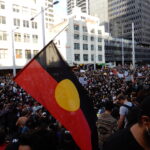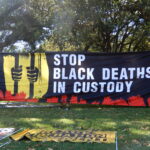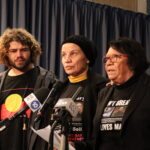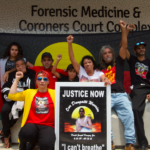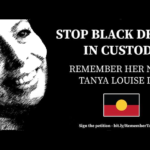Family Demands Inquest, After Hospital Sends Kamilaroi Dunghutti Man Home to Die
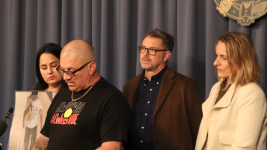
Ricky “Dougie” Hampson Junior presented to Dubbo Hospital last August, with severe stomach pain, which was accompanied by a popping and tearing sensation, while his heart was racing at a rate of 130 beats per minute.
Two perforated ulcers, which were tearing at the Kamilaroi Dunghutti man’s stomach lining and bowel wall, were the cause of his extreme pain.
Hospital staff didn’t give him a thorough examination, however. No scan or X-ray took place. Rather Dougie was given some strong painkillers, placed in a hospital bed, monitored, and around 18 hours later, he was told to go home and drink water.
Dougie tested positive for COVID-19 whilst in hospital. Yet, as he left through the front door, no one had bothered to tell him he had the deadly virus. And this was at the height of the pandemic in NSW: a time when preventing an outbreak in the west of the state was front and centre.
If a doctor had detected the rupturing ulcers, the condition could have been treated. But no one at the emergency department attempted to check, so the 36-year-old father-of-eight was sent away to die in pain.
First Nations people receiving lesser healthcare than required is a common occurrence in settler colonial Australia. Blatant racism in the system leads medical staff to make prejudicial assumptions about Indigenous people seeking treatment, so rather than help them, their requests are dismissed.
The Hampson family are now petitioning the NSW attorney general Mark Speakman to order an inquest into their loved one’s death, not only because they want answers, but so other Aboriginal and Torres Strait Islander families aren’t subjected to the same professional neglect.
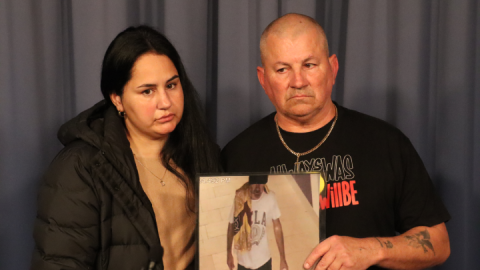
Treatment denied
“Next month, one year will have passed since Dougie’s death,” Ricky Hampson Senior told the reporters at NSW parliament on 5 July, “and yet, we’re still waiting for answers as to why he was treated with prejudice.”
“No senior medical doctor examined Dougie. They didn’t treat him the way they should have,” Dougie’s father continued. They simply thought, “here’s another black fella off the streets looking for painkillers and judged him that way.”
The Hampsons have launched an online petition, which has garnered over 12,500 signatures. It’s calling on the state’s chief lawmaker to order an inquest into how hospital staff could neglect to conduct a thorough examination that would’ve detected the treatable condition.
At state parliament, Ricky was joined by his daughter, Anita Chatfield, to request Speakman take the step in launching a coronial inquiry, as it would serve draw attention to the racism in the system and provide recommendations on how to deal with it.
“Unfortunately, this is a shocking thread amongst my community, when they go through the NSW health system,” Hampson added. “Unless the health professionals who failed my son are held accountable, Aboriginal people will keep dying of completely preventable causes.”
Disparities in healthcare
According to George Newhouse, the solicitor representing the family, the systemic neglect of First Nations people in Australian healthcare is another product of the colonial system, similar to the disproportionate rates of Indigenous incarceration.
“Too often though, the blame is placed on the victim,” the National Justice Project director told reporters. “The system doesn’t look at or critique its role in adverse health outcomes and the harm that it’s caused to First Nations people.”
Newhouse cited the inquest into the death of 27-year-old pregnant Wiradjuri woman Naomi Williams at Tumut Hospital on 1 January 2016, as a prime example of how such an investigation gives “the opportunity to turn the lens back on the system”.
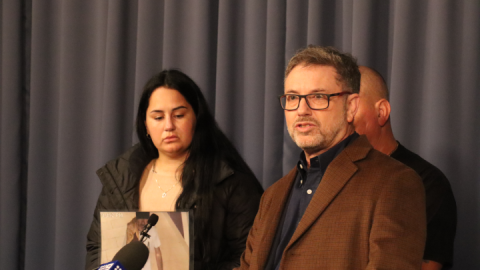
Making nine recommendations in her 2019 findings, NSW deputy state coroner Harriet Grahame discussed witness accounts and research that indicates First Nations people are receiving lesser healthcare in comparison to their non-Indigenous counterparts due to institutional racism.
Naomi’s mother, Sharon Williams, told the ABC last year, that while there have been improvements since the inquest, her daughter’s case, which involved her presenting 15 times with a treatable condition only to be sent away, had left First Nations locals to perceive the hospital as unsafe.
The Hampson family’s legal representative outlined that his clients “want our government to ensure there’s systemic change, so that Dougie’s death never happens again to another Indigenous family or any family”. And Newhouse pointed to the inquest as “the first step in that process”.
Two-tiered healthcare
In her Williams inquest findings, the deputy state coroner pointed to the research of Professor Yin Paradies, which outlines that First Nations people nationwide receive 30 percent fewer procedures, and there’s a “consistent pattern” with less treatment being administered due to Aboriginality.
“The system has failed Dougie’s family,” NSW Greens MLC Sue Higginson told reporters. “And the system continues to fail all First Nations people who are experiencing racist injustice at the hands of the state. This is evidence of the continuing brutality of colonialism.”
The Greens justice spokesperson underscored that the only way to “learn what tragically went so wrong” is that the state attorney general order an inquest into Dougie’s death so that a hospital system that provides two tiers of healthcare based on Indigenous status can be reformed.
Dougie’s sister and father stood before the cameras holding the last photo of him, which is a CCTV image taken as he left the hospital alone, despite being there for hours suffering a condition that could have been diagnosed, and certainly, there was no provision of a mask due to his COVID.
“It doesn’t matter who you are, your background or where you come from, in Australia, everyone should be treated with decency and care when they enter the hospital system,” Hampson said. “That is supposed to be our right.”
“We are asking for accountability and urgent changes to the way Aboriginal people are treated in the NSW health system.”



